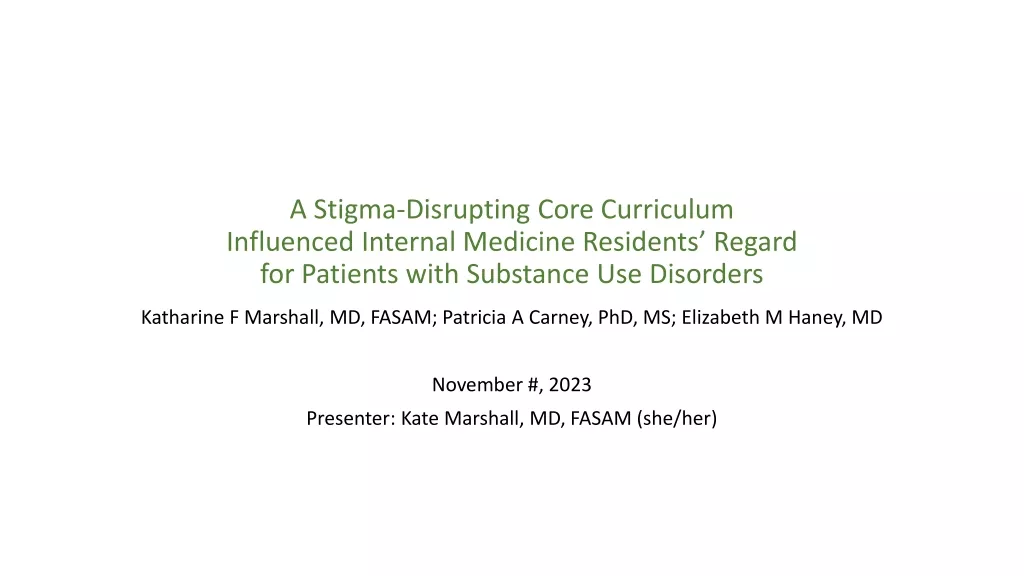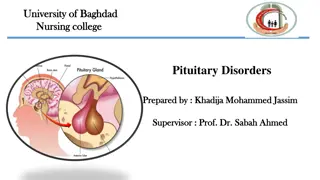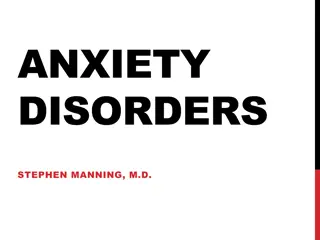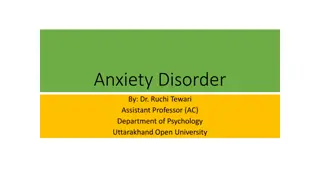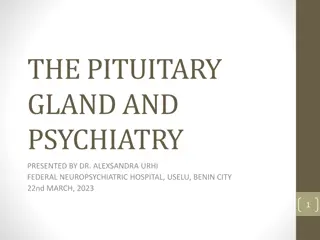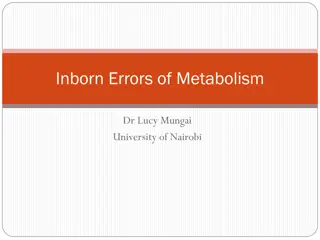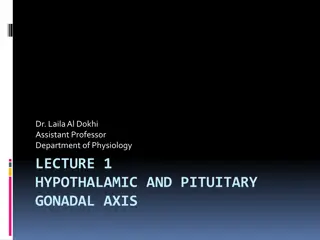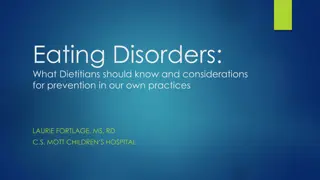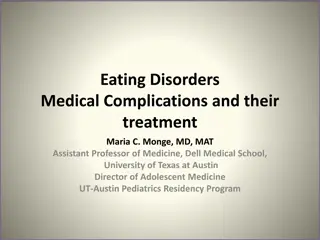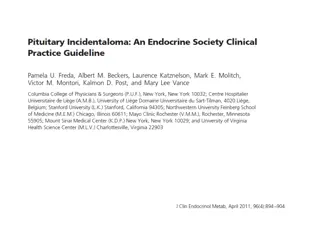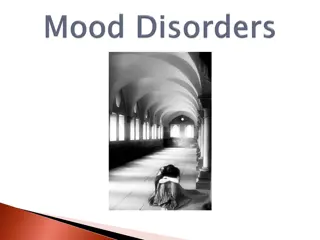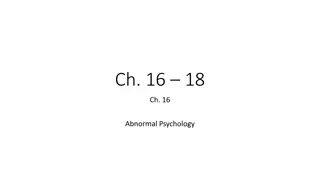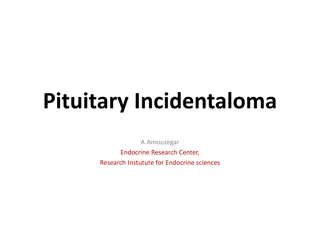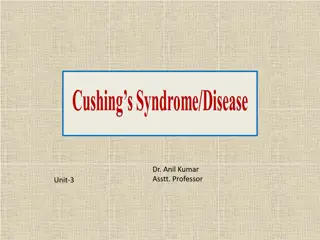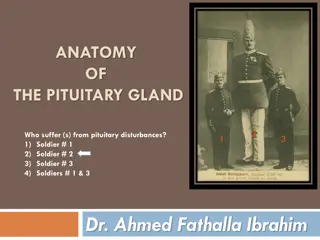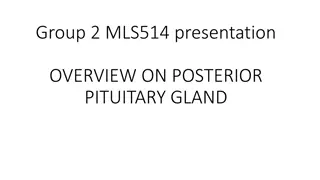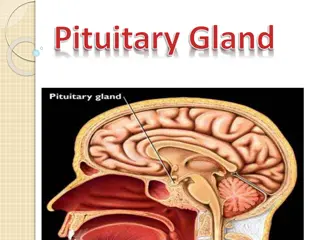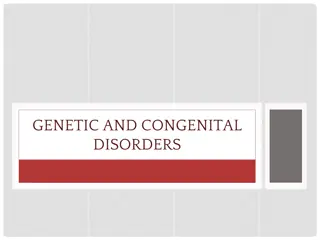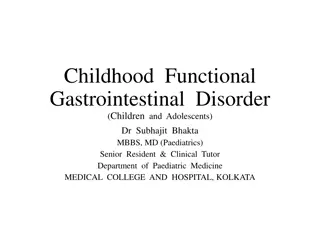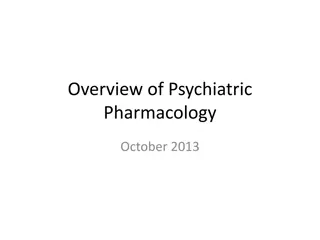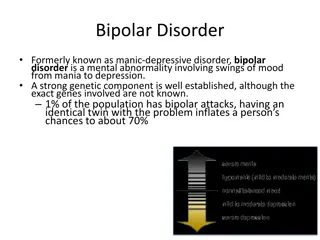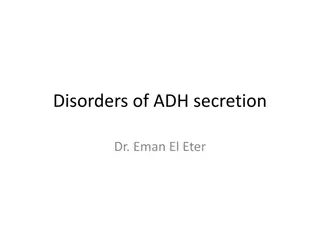Gynecological disorders
Common gynecological disorders including menstrual disorders and abnormal uterine bleeding. Find out about the nursing role in diagnosing and treating these disorders.
3 views • 22 slides
Enhancing Internal Medicine Residents' Approach to Patients with Substance Use Disorders
This study focuses on developing and implementing a stigma-disrupting curriculum to improve internal medicine residents' attitudes and knowledge regarding patients with substance use disorders. By addressing provider stigma and enhancing preparedness, the aim is to promote positive regard and increa
1 views • 27 slides
Exploring Mental Health Categories and Disorders
In today's categories, we delve into themes like stigma, recovery, myths, and facts surrounding mental health. We discuss various disorders including psychotic disorders and observable signs like hallucinations, delusions, and flat affect. Discover the signs and symptoms of mood disorders and high/l
1 views • 71 slides
Pituitary Disorders
Pituitary disorders, often caused by tumors, can disrupt hormone production leading to various symptoms like weight gain, vision problems, and hormonal imbalances. The pituitary gland plays a crucial role in regulating bodily functions through hormone secretion. Factors such as tumor growth, head in
0 views • 25 slides
Understanding Pituitary Gland Functions in Endocrinology Course
Explore the intricate workings of the pituitary gland in endocrinology, delving into hypo- and hyperfunction aspects, hormonal regulation, and physiological characteristics. Learn about the crucial role of hormones, their actions on target organs, and the specificity of their interactions with cellu
6 views • 71 slides
Understanding Hypothalamus and Pituitary Hormones in Clinical Pharmacology
Peptides and glycoproteins are secreted by the hypothalamus and pituitary, regulating anterior pituitary hormones. Hormones like adrenocorticotropic hormone (ACTH) and corticotropin-releasing hormone (CRH) play crucial roles. Synthetic adrenocorticosteroids have limited the use of corticotropin for
1 views • 28 slides
Overview of Human Genetic Disorders
Human genetic disorders encompass a range of conditions, from recessive disorders like cystic fibrosis to dominant disorders such as Huntington's disease. Examples include cystic fibrosis, Huntington's disease, and sickle-cell anemia. Understanding genetic disorders involves research and awareness o
0 views • 10 slides
Understanding Anxiety Disorders in DSM-5
Anxiety disorders encompass a range of conditions, from separation anxiety to social phobia and generalized anxiety disorder. The DSM-5 has re-conceptualized these disorders, grouping OCD in its own category and moving PTSD to trauma-related disorders. Recognizing symptoms and seeking appropriate tr
1 views • 96 slides
Understanding Anxiety Disorders and Related Conditions
Explore the distinguishing features of anxiety disorders such as generalized anxiety disorder, panic disorder, and phobias, along with insights into obsessive-compulsive disorder (OCD) and posttraumatic stress disorder (PTSD). Delve into the impact of conditioning, cognition, and biology on these co
2 views • 46 slides
Overview of Anxiety and Related Disorders
Anxiety disorders, such as PTSD, panic disorders, phobias, agoraphobia, and OCD, are characterized by varying degrees of fear and distress. Anxiety is a normal response to danger, but when it becomes chronic, it can lead to debilitating conditions. PTSD occurs post-trauma, panic disorders involve in
1 views • 42 slides
Understanding Anxiety Disorders: Causes, Symptoms, and Types
Anxiety disorders are a group of mental illnesses characterized by excessive and overwhelming anxiety and fear. This article explains the normal emotion of anxiety, symptoms of anxiety disorders, types of anxiety disorders, and common causes like genetics, brain chemistry, environmental stress, and
1 views • 8 slides
Understanding Somatic Symptom Disorders, Conversion Disorders, and Dissociative Disorders
Somatic symptom disorders manifest as physical symptoms without apparent cause, while conversion disorders involve specific physical symptoms incompatible with medical conditions. Illness anxiety disorder involves interpreting normal sensations as disease symptoms. Dissociative disorders lead to a s
1 views • 41 slides
Understanding the Pituitary Gland: Implications in Psychiatry
This presentation by Dr. Alexsandra Urhi delves into the anatomy, function, and psychiatric implications of the pituitary gland. It explores the interplay between endocrine structures, the CNS, and psychotropic drugs' effects on the pituitary gland.
0 views • 35 slides
Overview of Pituitary Gland: Structure, Function, and Relationships
The pituitary gland, also known as the hypophysis, is an endocrine gland located at the base of the brain. It is divided into two main parts: the adenohypophysis and the neurohypophysis. The gland plays a crucial role in hormone regulation and is closely related to neighboring structures such as the
0 views • 26 slides
Understanding Inborn Errors of Metabolism and Metabolic Disorders
Inborn Errors of Metabolism (IEM) are genetic disorders that disrupt metabolic pathways, leading to substrate accumulation or product deficiency. These disorders can be classified based on toxic accumulation, protein metabolism, carbohydrate intolerance, lysosomal storage issues, energy production d
0 views • 29 slides
Understanding Co-occurring Mental and Physical Health Conditions
Co-occurring mental and physical health disorders are prevalent and require an integrative multidisciplinary approach for effective assessment and treatment. This holistic approach helps address the complexity of managing multiple disorders in an integrated healthcare setting. Through a multi-direct
1 views • 37 slides
Understanding the Hypothalamic-Pituitary-Gonadal Axis in Reproductive Physiology
Explore the intricate relationship between the hypothalamus, pituitary gland, and gonads in regulating reproductive functions. Learn about hormone definitions, hypothalamic-pituitary interactions, gonadotropic hormones, and feedback mechanisms crucial for reproductive control.
0 views • 13 slides
Understanding Functional GI Disorders: A Comprehensive Overview
Functional GI disorders encompass a range of conditions affecting the gastrointestinal system, such as irritable bowel syndrome and disorders of the gut-brain interaction. These disorders are characterized by no structural abnormalities but are influenced by factors like motility disturbance, viscer
0 views • 42 slides
Understanding Genetic Disorders and Their Impact on Health
Genetic disorders are caused by abnormalities in genes or chromosomes, leading to various health conditions. Inherited disorders can be passed down from parents to children, affecting physical makeup and processes in the body. In India, there is a high prevalence of genetic disorders, particularly i
1 views • 12 slides
Understanding the Microscopic Structure and Function of the Pituitary Gland
Explore the detailed histology of the pituitary gland, focusing on its adenohypophysis and neurohypophysis components. Learn about the diverse parenchymal cells, including acidophils, basophils, and chromophobes, and their respective functions in hormone production. Dive into the significance of the
0 views • 6 slides
Understanding Eating Disorders: Types, Signs, Effects, and Recovery
Eating disorders are mental disorders characterized by unhealthy eating habits and can have severe physical and psychological consequences. This article explores the definition of eating disorders, signs to look out for, different types such as Anorexia Nervosa, Bulimia Nervosa, Pica, and Purging Di
0 views • 10 slides
Understanding Eating Disorders: Insights for Dietitians
Eating disorders are complex neurobiological conditions that are not merely about control or weight management. These disorders can affect individuals of all genders, body sizes, and socioeconomic backgrounds. Dietitians play a crucial role in identifying, assessing, and treating eating disorders, a
0 views • 41 slides
Understanding Eating Disorders: Medical Complications and Treatment
This presentation by Dr. Maria C. Monge covers the common eating disorders in teenage patients, potential medical complications, and the role of the medical team in treatment. It includes definitions of disorders like Anorexia Nervosa, Bulimia Nervosa, and Binge Eating Disorder according to DSM-5 cr
0 views • 60 slides
Pituitary Incidentaloma: Evaluation and Management Recommendations
A pituitary incidentaloma is an unsuspected pituitary lesion discovered incidentally during imaging studies not done for lesion-related symptoms. Patients should undergo a thorough evaluation for hormone hypersecretion and hypopituitarism, including clinical and laboratory assessments. Recommendatio
0 views • 69 slides
Understanding Neurodevelopmental Disorders in Childhood and Adolescence
Neurodevelopmental disorders in childhood and adolescence encompass a range of conditions including intellectual disabilities, communication disorders, autism spectrum disorder, and attention deficit/hyperactivity disorder. These disorders impact cognitive development, adaptive functioning, and comm
0 views • 30 slides
Understanding Sleep Disorders: Classification and Diagnosis
Sleep disorders encompass various conditions affecting sleep patterns and quality. They are classified into categories such as insomnia, sleep-related breathing disorders, central disorders of hypersomnolence, circadian rhythm sleep-wake disorders, parasomnias, and sleep-related movement disorders.
0 views • 32 slides
Understanding Grief and Depressive Disorders: A Comparative Analysis
Grief and depressive disorders share similarities but also have distinct differences. Grief is a universal emotional state following loss, while depressive disorders involve prolonged mood disturbances. The stages of grief include denial, anger, bargaining, depression, and acceptance, with intervent
0 views • 79 slides
Understanding Genetic Disorders and the Human Genome Project
The Human Genome Project, completed in 2003, aimed to identify all human genes and DNA sequences. Genetic disorders, like autosomal disorders and Huntington's disease, can result from mutations at different levels, affecting single genes, chromosomes, or multiple genes. Albinism and cystic fibrosis
0 views • 37 slides
Understanding Abnormal Psychology: Disorders, Symptoms, and Treatments
Explore the world of abnormal psychology through the lens of different disorders like depression, anxiety, and phobias. Learn about the definitions of abnormal behavior, DSM-V classifications, and various types of psychological disorders. Delve into the complexities of mental health conditions such
0 views • 39 slides
Understanding Pituitary Incidentalomas: Causes, Diagnosis, and Management
Pituitary incidentalomas are unexpected lesions found during imaging studies for unrelated reasons. Evaluation and management recommendations rely heavily on clinical experience due to limited literature on the topic. Etiology includes mostly pituitary adenomas and a small percentage of nonpituitary
0 views • 37 slides
Understanding Cushing Disease in Dogs and Cats
The pituitary gland, or "Master Gland," plays a crucial role in hormone regulation in the body. Cushing disease, a common endocrine disorder in middle-aged to older dogs and cats, is often caused by tumors in the pituitary or adrenal glands. Symptoms include increased thirst, appetite, panting, obes
0 views • 22 slides
Overview of Classification of Psychiatric Disorders
Psychiatric disorders are illnesses with various manifestations that impact functioning due to disturbances in biological, social, genetic, and other factors. Two key classification systems, ICD-10 and DSM-5, categorize over 200 types of psychiatric illnesses. The ICD-10 includes categories like org
0 views • 18 slides
Understanding the Pituitary Gland: Anatomy, Functions, and Disorders
The pituitary gland, also known as the master endocrine gland, plays a crucial role in regulating various hormonal functions in the body. Learn about its anatomy, position, subdivisions, important relations, and common disturbances. Explore how soldiers and individuals like them can be affected by p
0 views • 17 slides
Understanding the Posterior Pituitary Gland and Its Hormones
The posterior pituitary gland, a key part of the endocrine system, plays a vital role in hormone secretion. It controls the release of oxytocin and vasopressin, influencing social bonding, reproduction, and childbirth. Learn about the anatomy, function, and disorders associated with this important g
0 views • 26 slides
Understanding the Pituitary Gland: Structure, Function, and Hormones
The pituitary gland, located at the base of the brain, comprises two main portions - the anterior lobe (adenohypophysis) and the neurohypophysis. The anterior lobe consists of various cell types that secrete hormones like GH, prolactin, TSH, ACTH, FSH, and LH. GH, also known as STH, plays a crucial
0 views • 17 slides
Overview of Genetic and Congenital Disorders and Their Causes
Explore the terminology, causes, characteristics, and results of genetic and congenital disorders, as well as the disorders of single-gene inheritance. Learn about autosomal dominant disorders like Marfan Syndrome and Neurofibromatosis. Discover how single-gene disorders are inherited and their impa
0 views • 24 slides
Understanding Childhood Functional Gastrointestinal Disorders
Functional Gastrointestinal Disorders (FGIDs) in children and adolescents are characterized by chronic or recurring symptoms that cannot be fully explained by current structural or biochemical tests. These disorders emphasize the role of normal development in symptom presentation and the lack of evi
0 views • 46 slides
Overview of Psychiatric Pharmacology: A Comprehensive Guide from 2013
This presentation delves into the nuances of psychiatric pharmacology, exploring common psychiatric conditions, historical perspectives on medical treatments, categories of psychiatric medications, and principles of treatment. It also touches on mental illness definitions from DSM-IV-TR and DSM-V, a
0 views • 27 slides
Understanding Mental Health Disorders: Bipolar Disorder, Anxiety Disorders, & More
Exploring various mental health disorders such as Bipolar Disorder, Anxiety Disorders, Generalized Anxiety Disorder, Panic Disorder, and Phobic Disorders. Learn about their symptoms, prevalence, and impacts on individuals' lives.
0 views • 41 slides
Understanding Disorders of ADH Secretion: Causes, Symptoms, and Treatments
Disorders of ADH secretion, such as Diabetes Insipidus and Syndrome of Inappropriate ADH Secretion (SIADH), present various manifestations like polyuria, polydipsia, and dehydration. Different types of Diabetes Insipidus have specific causes and treatments. Central DI results from pituitary gland da
0 views • 12 slides

